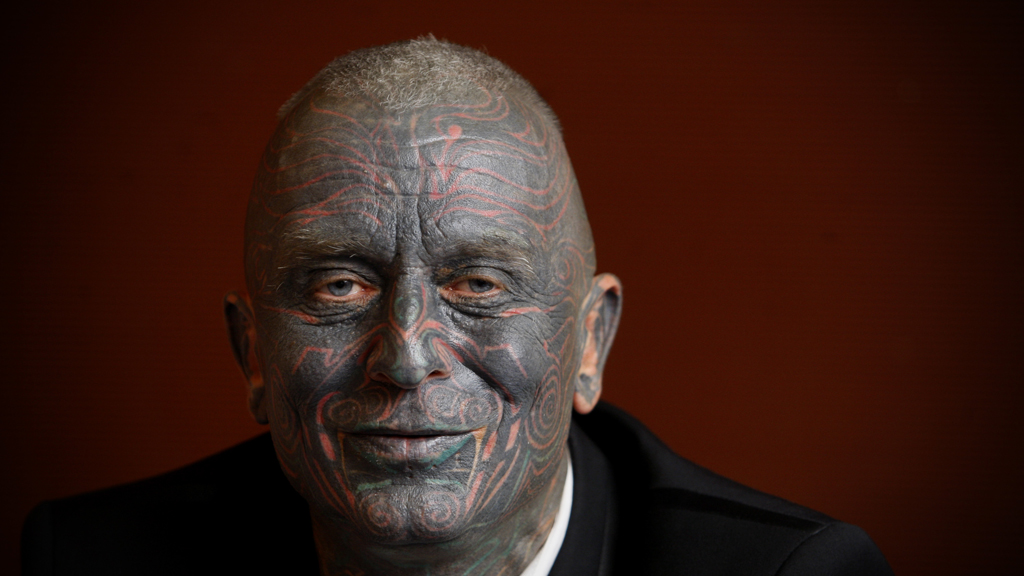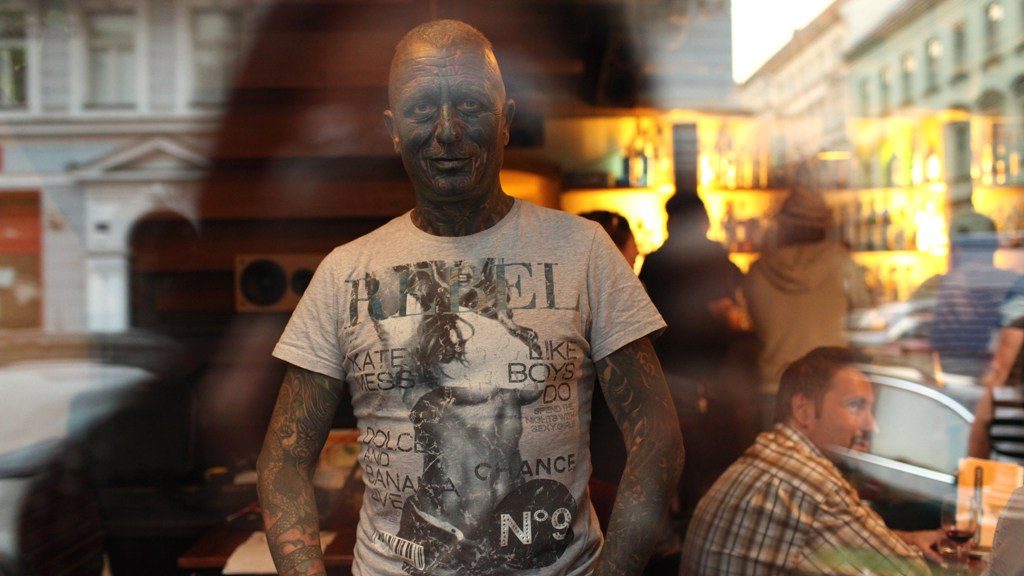Tattooed artist in running for Czech presidential elections
As Czechs go to the polls to vote for a new president, meet Vladimir Franz: artist, professor, promising presidential candidate – who also happens to be tattooed from head to toe.

He nearly missed the elections altogether because his opera, War with the Newts, premieres at the Prague State Opera next week. Fortunately he did not, because Vladimir Franz has become the surprise success story of the first ever Czech presidential elections.
In the past, the president of the Czech Republic has been selected by politicians. But today, for the first time ever, Czech citizens are voting on who they would like to see in the largely ceremonial role conducted from Prague Castle. The winner will follow in the illustrious footsteps of Vaclav Havel and the more controversial footsteps of the incumbent, Vaclav Klaus.
As voting begins, tattooed artist and professor Vladimir Franz is third in some of the key polls, with around 11 per cent of the vote. Even the man himself is surprised.
I understood it as a joke at first. Vladimir Franz, Czech presidential candidate
“When I learned, cut off from civilisation in the studio, that there was a movement – Vladimir Franz for president – I understood it as a joke at first, because I never sought the position,” he told Channel 4 News.
“But I appreciate the fact that there is now a generation of people who care for the future of this country. This is essential for me not only as an artist, but as a teacher… So perhaps the time has come for me to discover a new road.”
Franz is not expected to triumph in this weekend’s first round of elections, but he could end up as a kingmaker if he directs his followers to vote for the other two leading candidates in later stages in the election.
The colourful candidate burst onto the scene last year, when supporters set up a Facebook group calling for him to run in the election. He bowed to pressure despite admitting he has no political experience and little knowledge of economics – and, as he puts it, the “whole thing began to accelerate”.
He has reportedly only spent £16,000 on the campaign, has put up no posters, and his presidential bid is staffed by volunteers. An academic, working as a senior lecturer at the Academy of Performing Arts in Prague, Franz is not affiliated with any political party and has instead campaigned on an anti-corruption, pro-education message. It is a platform that has appealed to an electorate sick of the corruption scandals which have dogged the country since the end of the communist era more than 20 years ago.
Political analyst Jiri Pehe, former advisor to Havel, said Franz was effectively a “protest” candidate.
“He represents an alternative for people who do not take the presidency very seriously. In a way, he draws protest votes,” he told Channel 4 News.
However, Vit Kleparnik of the CESTA think tank said Franz was more than that.
“He is authentic in many ways – he appeals to people who want to give the state back to the citizens, stressing Havel and Masaryk (the first president of Czechoslovakia)’s heritage,” he said.
Of course, Franz is not universally admired. Some have suggested he has links in the past to “skinheads”, which Franz himself has denied – colleagues of the time say instead he had no sympathy for Nazism or neo-Nazism but wanted instead to teach Czech skinheads and calm them.
Politics and body art
Whatever the reasons for his popularity, Franz has certainly brightened up the roster of presidential candidates.
The two current frontrunners are both former prime ministers: left-winger Milos Zeman, and right-winger Jan Fischer, who Kleparnik described as a “grey mouse” – and they have hardly set the world alight. Neither is expected to win outright in the first round, with a run-off set for 25-26 January.
Other candidates include 75-year-old foreign minister Karel Schwarzenberg, an aristocrat who has a reputation for falling asleep in public, and principled leftist candidate Jiri Dienstbier Jr.
But it is Franz who has grabbed headlines globally, and with his spirited defence of his body art to Channel 4 News – hardly the kind of sentence usually written about politicians – you can understand why.
“Tattoos are an expression of free will, which do not interfere with the freedom of others,” he said.
“To have his own aesthetic view of the world is the right of every free individual. To me, it is also an expression of the permanent decision to stand up for my choices, good and bad. My tattoo is the result of a long-term sophisticated conception, not a sudden movement of the mind.
“To rate a human being only according to appearance – no matter if it was given by nature or voluntarily by himself – is a sign of superficiality and arrogance at the same time.”
